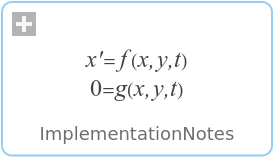WOLFRAM SYSTEM MODELER
ImplementationNotesImplementation Notes |
|
Wolfram Language
In[1]:=

SystemModel["Modelica.Utilities.UsersGuide.ImplementationNotes"]
Out[1]:=

Information
This information is part of the Modelica Standard Library maintained by the Modelica Association.
Below the major design decisions of this library are summarized.
- C-Function Interface
This library contains several interfaces to C-functions in order to operate with the environment. As will become clear, it is usually required that a Modelica tool vendor provides an implementation of these C-functions that are suited for his environment. In directory "Modelica/Resources/C-Sources" a reference implementation is given for Microsoft Windows Systems and for POSIX environments. The files "ModelicaInternal.c" and "ModelicaStrings.c" can be used as a basis for the integration in the vendors environment.
- Character Encoding
The representation of characters is different in operating systems. The more modern ones (e.g., Windows-NT) use an early variant of Unicode (16 bit per character) other (e.g., Windows-ME) use 8-bit encoding. Also 32 bit per character and multi-byte representations are in use. This is important, since e.g., Japanese Modelica users need Unicode representation. The design in this library is done in such a way that a basic set of calls to the operating system hides the actual character representation. This means, that all functions of this package can be used independent from the underlying character representation.
The C-interface of the Modelica language provides only an 8-bit character encoding passing mechanism of strings. As a result, the reference implementation in "Modelica.Utilities\C-Source" needs to be adapted to the character representation supported in the Modelica vendor environment.
- Internal String Representation
The design of this package was made in order that string handling is convenient. This is in contrast to, e.g., the C-language, where string handling is inconvenient, cumbersome and error prone, but on the other hand is in some sense "efficient". The standard reference implementation in "Modelica.Utilities\C-Source" is based on the standard C definition of a string, i.e., a pointer to a sequence of characters, ended with a null terminating character. In order that the string handling in this package is convenient, some assumptions have been made, especially, that the access to a substring is efficient (O(1) access instead of O(n) as in standard C). This allows to hide string pointer arithmetic from the user. In such a case, a similar efficiency as in C can be expected for most high level operations, such as find, sort, replace. The "efficient character access" can be reached if, e.g., the number of characters are stored in a string, and the length of a character is fixed, say 16 or 32 bit (if all Unicode characters shall be represented). A vendor should adapt the reference implementation in this respect.
- String copy = pointer copy
The Modelica language has no mechanism to change a character of a string. When a string has to be modified, the only way to achieve this is to generate it newly. The advantage is that a Modelica tool can treat a string as a constant entity and can replace (expensive) string copy operations by pointer copy operations. For example, when sorting a set of strings the following type of operations occur:
Formally, three strings are copied. Due to the feature sketched above, a Modelica tool can replace this copy operation by pointer assignments, a very "cheap" operation. The Modelica.Utilities functions will perform efficiently, if such types of optimizations are supported by the tool.String s[:], s_temp; ... s_temp := s[i]; s[i] := s[j]; s[j] := s_temp;
